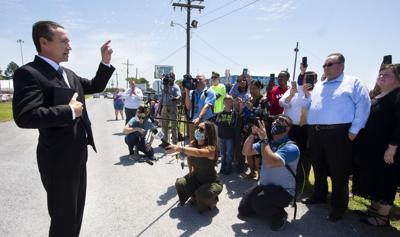A federal judge in Baton Rouge has reaffirmed that Gov. John Bel Edwards has the authority to fashion "reasonable restrictions" on religious activity during the novel coronavirus pandemic and that his series of gradually evolving limits on public gatherings this year complied with the Constitution.
U.S. District Judge Brian Jackson this week dismissed claims by a Central pastor who claimed the governor's orders limiting church service crowd sizes violated First Amendment and other constitutional rights.
Lines of people, many without masks, queued up at a bustling Livingston Parish barbecue restaurant Monday, just days after the state revoked t…
The Rev. Tony Spell, pastor of Life Tabernacle Church, garnered worldwide attention this spring for his brash style and public stand against Edwards' most restrictive limits on public gatherings during the statewide lockdown. He even landed in jail over an alleged confrontation with a person protesting his church's activities.
At the time, Edwards had imposed a stay-at-home order that limited public gatherings to fewer than 10 people. The order forced most houses of worship to operate remotely for weeks, though Spell continued to preach to hundreds at his church on Hooper Road.
With his profile raised by the attention, Spell later helped organize a protest and part-religious revival outside the Governor's Mansion this spring and supported a Livingston Parish barbecue restaurant's fight mask requirements this summer.
Tuesday, Jackson dismissed Spell's federal claims with prejudice, meaning they can't be raised again, and Spell can no longer pursue monetary damages. The judge dismissed Edwards, East Baton Rouge Parish Sheriff Sid Gautreaux and Central Police Chief Roger Corcoran from the lawsuit.
A federal appeals court ruled Thursday that Central pastor Tony Spell's lawsuit against the governor, which claimed Louisiana's social distanc…
Spell had previously agreed to dismiss other defendants from the case, including Mayor-President Sharon Weston Broome and Central Mayor David Barrow.
In his ruling for the governor, Jackson cited other recent court decisions over pandemic restrictions on churches in California, Illinois, Maine and Virginia, along with a 1905 U.S. Supreme Court ruling related to smallpox. It says the First Amendment right of free expression is not absolute during a public health emergency.
"The overwhelming consensus of courts throughout the United States reveals that reasonable restrictions on religious gatherings comply with Constitutional standards," Jackson wrote in the 15-page ruling Tuesday.
Other aspects of Edwards' coronavirus orders have already withstood court challenges from bar owners and others as the viral outbreak has dragged on and the economic pain of those restrictions has continued. Litigation over the Livingston Parish barbecue joint that refused to require mask wearing by customers is still pending.
In May, Jackson had previously rejected Spell's claims when the pastor was seeking an emergency, temporary order to block Edwards' restrictions. At the time, the judge had left open a decision on whether Spell's constitutional rights had been violated and whether he could win monetary damages.
Before the Rev. Tony Spell gained massive notoriety for his refusal to stop holding church services amid the coronavirus shutdown, the unyield…
While Jackson's ruling Tuesday addresses the federal claims in the suit, the judge did not rule on state constitutional violations that also have been raised.
Shauna Sanford, spokeswoman for Edwards, said Jackson's ruling found what the governor knew all along, that his stay-at-home order was constitutional.
"It was a decision based on the science and the data and very necessary in order to protect the health and safety of our people and our state," Sanford said. "It’s unfortunate that this baseless lawsuit was ever brought in the first place."
She added that COVID-19 remains a "very real problem" and mitigation measures are still needed in the state.
Jeffrey Wittenbrink, one of Spell's attorneys, declined to comment directly on the ruling but said his client plans an appeal.
A federal judge has rejected Central pastor Tony Spell’s lawsuit claiming that the stay-at-home order Gov. John Bel Edwards implemented to sto…
Spell is also seeking to bring Jackson's earlier ruling in the case before the U.S. Supreme Court. In June, the 5th U.S. Circuit Court of Appeals declared that part of the case moot because the state stay-at-home order had expired.
One of Spell's and his attorneys' frequent complaints with Edwards' orders, especially the most restrictive ones in the spring, has been that they were unfair. Essential businesses, like groceries and big box hardware stores, were exempted from crowd limits while constitutionally protected activities in houses of worship had a tight leash, they argued.
In the ruling Tuesday, Judge Jackson pointed to a U.S. Supreme Court ruling that upheld limits on houses of worship in California earlier this year that addressed differential treatment of churches and some businesses in that state.
Chief Justice John Roberts found, Judge Jackson noted, that the church limits in California were similar for comparable secular gatherings. More lenient limits on groceries and other places were acceptable because those businesses weren't comparable to the risk in churches, where people might spend longer periods of time together in large groups.
Edwards has had the same approach in Louisiana, Jackson found.
"Governor Edwards's Proclamations have always treated comparable secular institutions similarly to comparable religious institutions," the judge wrote.
A Central pastor who has defied emergency orders during the coronavirus outbreak by holding religious services has filed a lawsuit accusing st…
In recent months, Jackson added, churches in Louisiana have received more favorable treatment under Edwards' orders than comparable secular gathering places.
Edwards' current order limits churches to no more than 75% of their capacity.









